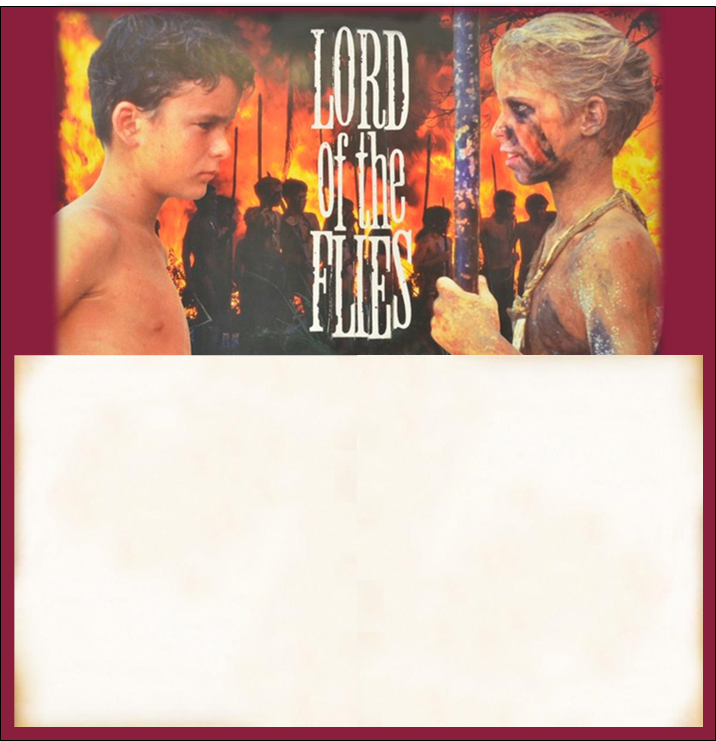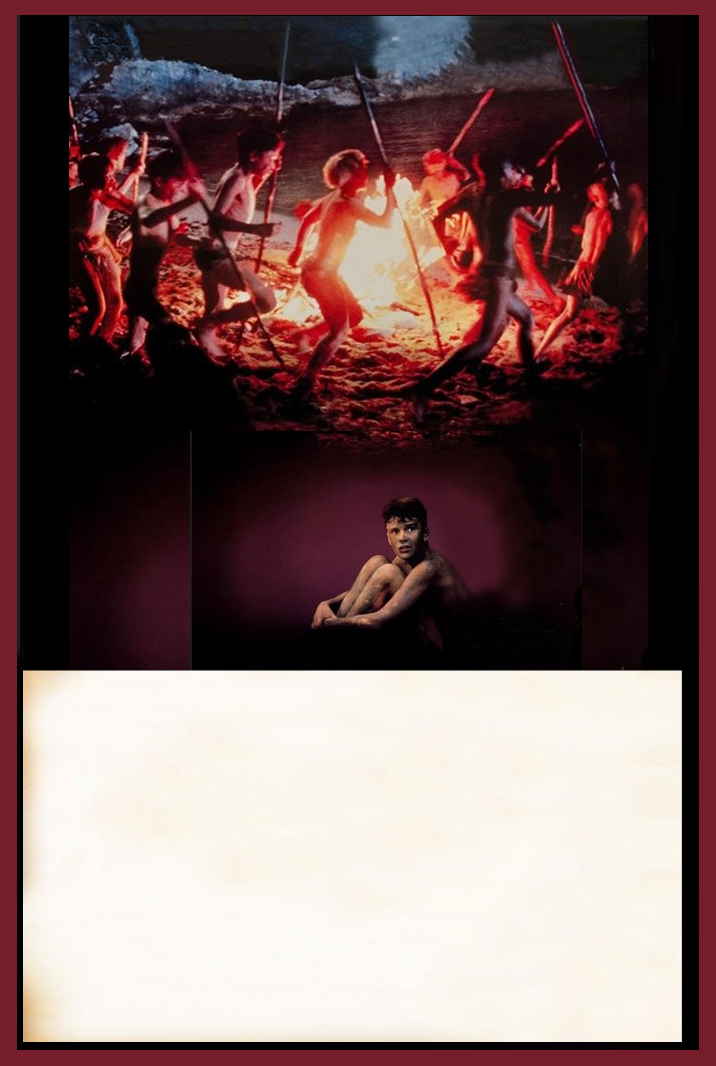Робочий аркуш (a worksheet): "Lord of the Flies by Sir William Golding"
Спецкурс з Літератури Великої Британії для учнів 10-11 класів
Тема: Література другої половини XX ст.
English Literature
 LORD OF THE FLIES by SIR WILLIAM GOLDING
LORD OF THE FLIES by SIR WILLIAM GOLDING
|
ABOUT THE AUTHOR William Golding, in full Sir William Gerald Golding (1911—1993) is an English novelist who in 1983 won the Nobel Prize for Literature for his parables of the human condition. He attracted a cult of followers, especially among the youth of the Post-World War II generation. Educated at Marlborough Grammar School, where his father taught, and at Brasenose College, Oxford, Golding graduated in 1935. After working in a settlement house and in small theatre companies, he became a schoolmaster at Bishop Wordsworth’s School, Salisbury. He joined the Royal Navy in 1940, took part in the action that saw the sinking of the German battleship Bismarck, and commanded a rocket -launching craft during the invasion of France in 1944. After the war he resumed teaching at Bishop Wordsworth’s until 1961. Golding’s first published novel was Lord of Flies (1954; film 1963 and 1990), the story of a group of schoolboys isolated on a coral island who revert to savagery. Its imaginative and brutal depiction of the rapid and inevitable dissolution of social mores aroused widespread interest. The Inheritors (1955), set in the last days of Neanderthal man, is another story of the essential violence and depravity of human nature. The guilt-filled reflections of a naval officer, his ship torpedoed, who faces an agonizing death are the subject of Pincher Martin (1956). Two other novels, Free Fall (1959) and The Spire (1964), also demonstrate Golding’s belief that ‘man produces evil as a bee produces honey’. Darkness Visible (1979) tells the story of a boy horribly burned in the London blitz during World War II. His la ter works include Rites of Passage (1980), which won the Booker McConnell Prize, and its sequels, Close Quarters (1987) and Fire Down Below (1989). Golding was knighted in 1988.
|
ABOUT THE STORY
A group of English children was taken on board a plane to a safer place because an atomic war had broken out. The plane crashed and the boys found themsomewhere in the Pacific. The boys realised the necessity of rulesselves on an uninhabited island that would regulate their life. One of the boys, Ralph, was elected Chief; they agreed to hold assemblies to discuss their problems. They gathered to the sound of a conch in his hands. Ralph suggested building shelters and making a fire so that a ship sailing by might notice the smoke and come to their rescue. A group of boys with Jack at the head were to hunt for pigs, the others were to keep the fire burning. To make a fire the boys used the glasses one of the boys, Piggy, wore.
Gradually, the hunters grew more and more fierce. The sense of their power, the smell and sight of blood and fresh meat brought out savage instincts in them. They painted their faces and bodies, after the hunt they used to dance imitating hunting scenes and singing ‘Kill the pig! Cut her throat! Spill the blood!’
 Once they put up the head of a killed pig on a stick. Lord of the Flies — the ugly-looking head, covered with flies, became a symbol of their power. As time passed, more and more boys gave up the tiresome job of bfire and joined the hunters. Jack who had always been jealous of uilding the shelters and keeping the Ralph's authority did his best to establish his power over them. He skillfully made use of the boys' fear of the Beast which, as they thought, lived on the top of the mountain. Soon there were only Ralph, Piggy and Simon to keep the fire burning. One day Simon, a very shy, but intelligent and bright boy, decided to find out whether there really was any beast on the island. He climbed the mountain and saw that the thing they were all so afraid of was nothing but the dead body of an airman. Simon hurried down the mountain to tell the boys that they did not need to be afraid of the Beast. It was already dark, the boys were having a dance. Overcome by fear and bloodthirst they mistook Simon for the beast and killed him. One night Jack and the other hunters ruined Ralph's and Piggy's shelter, beat them and stole Piggy's glasses to make a fire for roasting meat. Some boys were sent to guard the hunter's camp against the enemy — Ralph and Piggy. These two made an attempt to tell the hunters how unreasonable their behavior was, but the guard, on Jack's order, killed Piggy. The beautiful conch that Piggy was holding in his hands broke to pieces. Ralph had to hide himself in the forest. Jack and his boys hunted him. They set the wood on fire. Fortunately, the smoke was noticed from a ship sailing by and Ralph was saved. To the grown ups the dramatic events on the island seemed no more than a children's game. But Ralph knew it was not.
Once they put up the head of a killed pig on a stick. Lord of the Flies — the ugly-looking head, covered with flies, became a symbol of their power. As time passed, more and more boys gave up the tiresome job of bfire and joined the hunters. Jack who had always been jealous of uilding the shelters and keeping the Ralph's authority did his best to establish his power over them. He skillfully made use of the boys' fear of the Beast which, as they thought, lived on the top of the mountain. Soon there were only Ralph, Piggy and Simon to keep the fire burning. One day Simon, a very shy, but intelligent and bright boy, decided to find out whether there really was any beast on the island. He climbed the mountain and saw that the thing they were all so afraid of was nothing but the dead body of an airman. Simon hurried down the mountain to tell the boys that they did not need to be afraid of the Beast. It was already dark, the boys were having a dance. Overcome by fear and bloodthirst they mistook Simon for the beast and killed him. One night Jack and the other hunters ruined Ralph's and Piggy's shelter, beat them and stole Piggy's glasses to make a fire for roasting meat. Some boys were sent to guard the hunter's camp against the enemy — Ralph and Piggy. These two made an attempt to tell the hunters how unreasonable their behavior was, but the guard, on Jack's order, killed Piggy. The beautiful conch that Piggy was holding in his hands broke to pieces. Ralph had to hide himself in the forest. Jack and his boys hunted him. They set the wood on fire. Fortunately, the smoke was noticed from a ship sailing by and Ralph was saved. To the grown ups the dramatic events on the island seemed no more than a children's game. But Ralph knew it was not.
TASK B. Read the text about the author TASK D. Read the extract from the novel and and answer he following questions: answer the following questions:
1.
What accomplishments was Golding knighted for? 1. The final arrival of the Naval officer seems like a happy and ironic ending, but if one thinks deeper, it is just .
2. What did Golding choose for his leading literary theme? a continuation from one war to another war
3. Could there be any connection between his teaching
school children and the knowledge of children’s brutality?
TASK C. Read the text about the story and answer the following questions:
1. What is the basic theme of the novel?
2. What negative sides of human nature are brought up in the novel?
3. Cruelty goes side by side with childish fears. What does the author achieve with such sharp contrast?
4. Who is the Lord of flies?
taking place outside world. Nevertheless, help did come, though from outside.
Why do you think Golding did not allow cruelty and savagery to be stopped by the boys themselves?
2. The decisive role in the narration is given to dialogue. What are its literary characteristics here?
Is it different from the previous literary works you studied?
3. Think of the ways cruelty at school can be stopped. Consider technical innovations, children’s clothes
and other aspects of youth life and write a personal essay
5. Who is the Beast? This extract from Chapter 12 is the last scene of the novel. (about 80-100 words).
<…> The officer inspected the little scarecrow in front of “No, sir.” him. The kid needed a bath, a haircut, a nose-wipe and a “I should have thought,” said the officer as he visualized the good deal of ointment. search before him, “I should have thought that a pack of British
“Nobody killed, I hope? Any dead bodies?” boys — you’re all British, aren’t you? — would have been able to
“Only two. And they’ve gone.” put up a better show than that — I mean.”
The officer leaned down and looked closely at Ralph. “It was like that at first,” said Ralph, “before things…”
“Two? Killed?” He stopped. “We were together then…”
Ralph nodded again. Behind him, the whole island was The officer nodded helpfully.
shuddering with flame. The officer knew, as a rule, when “I know. Jolly good show. Like the Coral Island.” people were telling the truth. He whistled softly. Ralph looked at him dumbly. For a moment he had a fleeting Other boys were appearing now, tiny tots some of them, picture of the strange glamour that had once invested the brown, with the distended bellies of small savages. One of beaches. But the island was scorched up like dead wood — them came close to the officer and looked up. Simon was dead — and Jack had. . . . The tears began to flow and
“I’m, I’m…” sobs shook him. He gave himself up to them now for the first
 But there was no more to come. <…> time on the island; great, shuddering spasms of grief that seemed The officer turned back to Ralph. to wrench his whole body. His voice rose under the black smoke “We’ll take you off. How many of you are there?” before the burning wreckage of the island; and infected by that Ralph shook his head. The officer looked past him to the emotion, the other little boys began to shake and sob too. And in group of painted boys. the middle of them, with filthy body, matted hair, and unwiped “Who’s boss here?” nose, Ralph wept for the end of innocence, the darkness of man’s “I am,” said Ralph loudly. heart, and the fall through the air of the true, wise friend called A little boy who wore the remains of an extraordinary Piggy.
But there was no more to come. <…> time on the island; great, shuddering spasms of grief that seemed The officer turned back to Ralph. to wrench his whole body. His voice rose under the black smoke “We’ll take you off. How many of you are there?” before the burning wreckage of the island; and infected by that Ralph shook his head. The officer looked past him to the emotion, the other little boys began to shake and sob too. And in group of painted boys. the middle of them, with filthy body, matted hair, and unwiped “Who’s boss here?” nose, Ralph wept for the end of innocence, the darkness of man’s “I am,” said Ralph loudly. heart, and the fall through the air of the true, wise friend called A little boy who wore the remains of an extraordinary Piggy.
black cap on his red hair and who carried the remains of a pair The officer, surrounded by these noises, was moved and a of spectacles at his waist, started forward, then changed his little embarrassed. He turned away to give them time to pull mind and stood still. themselves together; and waited, allowing his eyes to rest on the
“We saw your smoke. And you don’t know how many of trim cruiser in the distance. you there are.’


про публікацію авторської розробки
Додати розробку
